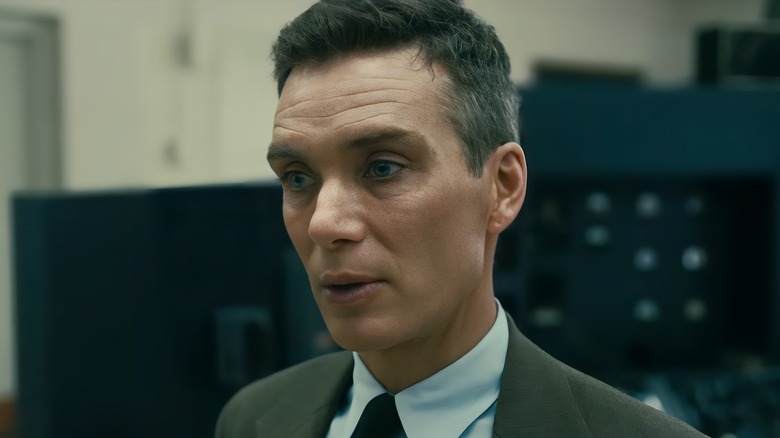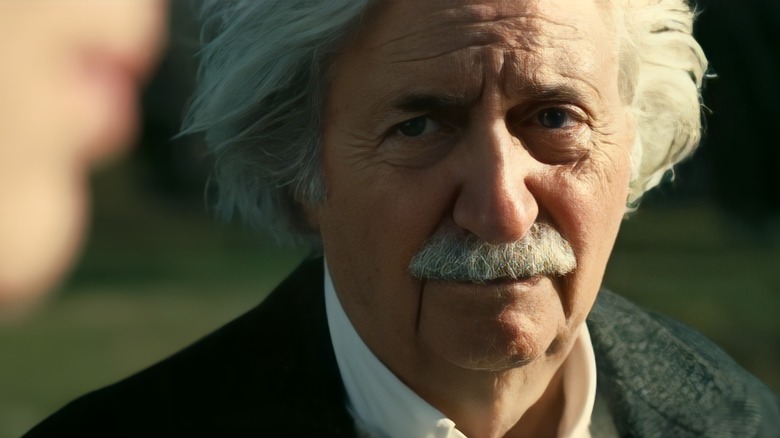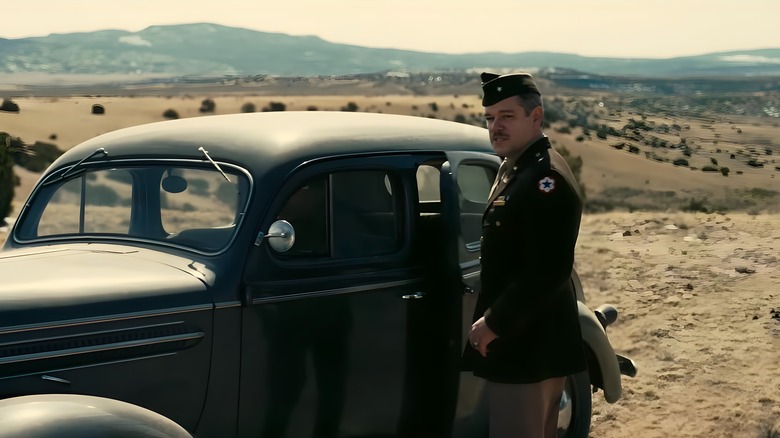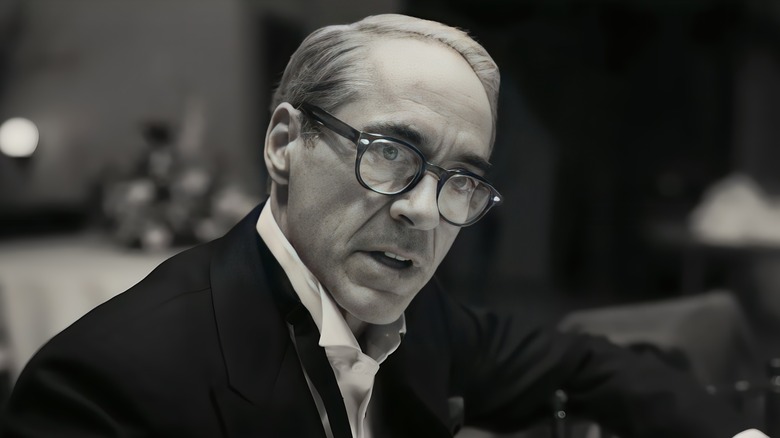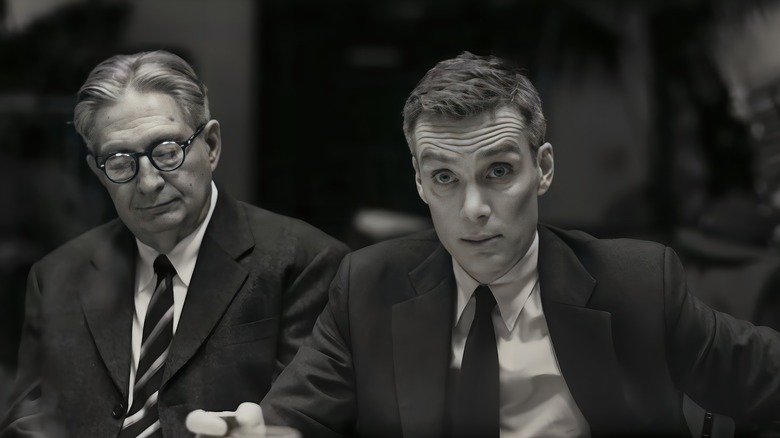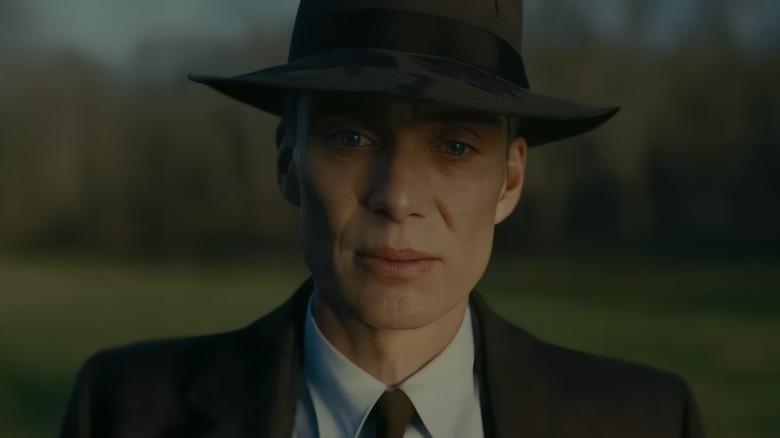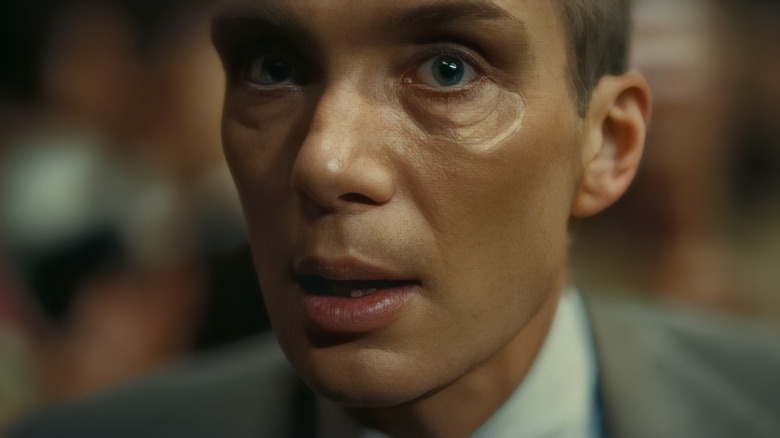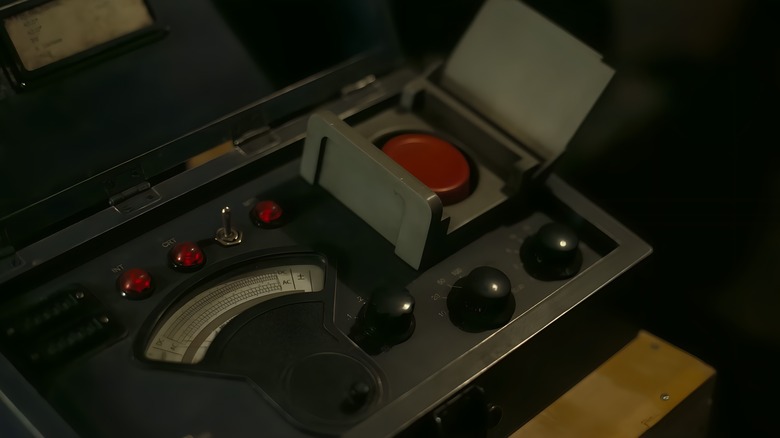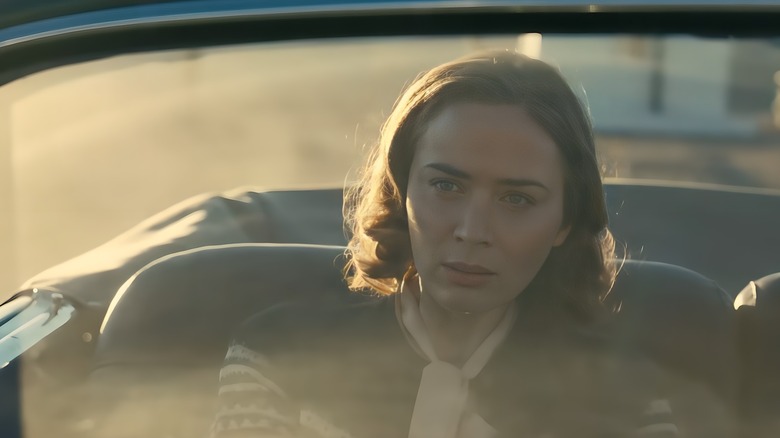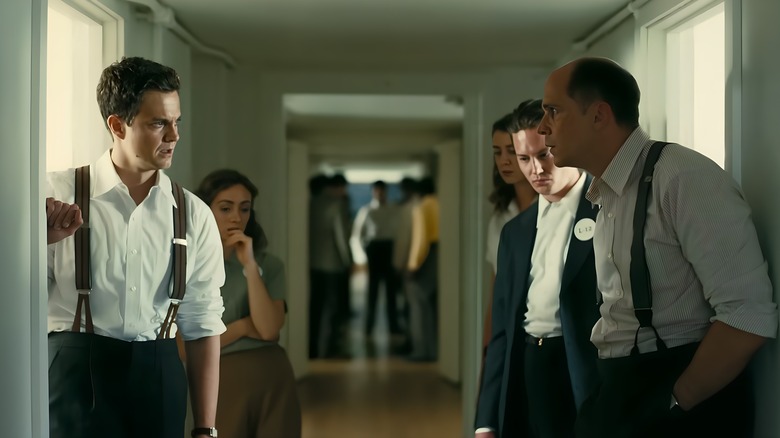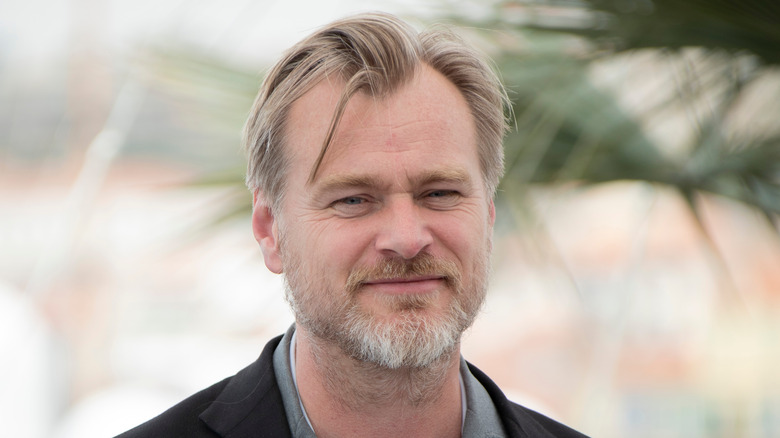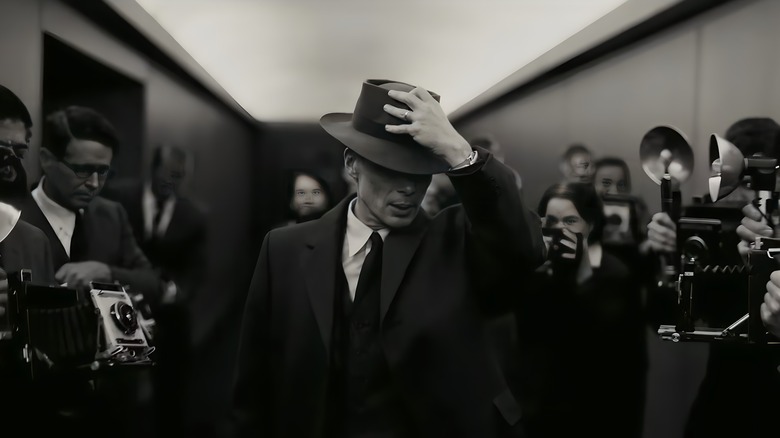The Ending Of Oppenheimer Explained
Christopher Nolan's "Oppenheimer" is many things. It's a biopic about one of the most fascinating individuals of the 20th century. It's a stylish, relentless portrait of the world's descent into the nuclear age. It's an unanswered question about the burden of responsibility in the brutal march of technological progress. And it's one of the best movies Nolan has ever made, led by an incredible performance from Cillian Murphy as Oppenheimer.
Watching the film is like watching a bomb explode in slow motion. There's hardly a moment to catch your breath, as the breakneck pace and Ludwig Göransson's thundering score mercilessly yank viewers from one fragmented scene to the next. Equal parts horror movie and dark historical epic, "Oppenheimer" wastes no time trying to save the souls of its subjects. It portrays its protagonist and the many supporting players around him in plain terms — regular people, some brilliant and some cunning, who nonetheless choose to bring mass murder to the world.
The ending of "Oppenheimer" isn't a happy one, either for the man himself or the world around him. Of course, it would be woefully irresponsible if it were. Because of the film's fragmented timeline, which constantly jumps between Oppenheimer's training, the Manhattan Project, and the later years of his life, there isn't much time to settle down for a proper finale. Instead, "Oppenheimer" ends as it begins — with a brutal, unfiltered vision of the world after the bomb.
What you need to remember about the plot of Oppenheimer
A number of primary threads weave their way through "Oppenheimer." First and foremost is the Manhattan Project, but that arc doesn't begin until the middle act. The first hour primarily concerns Oppenheimer's early years — his training in Europe with the likes of Niels Bohr (Kenneth Branagh) and Werner Heisenberg (Matthias Schweighöfer), a troubling time when he almost poisoned one of his instructors (an allegedly true story), and the beginning of his time at UC Berkeley.
While in California, he has a tumultuous courtship with communist writer and organizer Jean Tatlock (Florence Pugh) that eventually ends when her mental health issues prevent her from committing to their relationship. Jean later dies by suicide — another part of the film that's sadly true to life — while Oppenheimer is working on the Manhattan Project at the Los Alamos facility. In the interim, he marries Kitty (Emily Blunt), with whom he remains for the rest of his life.
Before he's recruited to build the bomb, he becomes involved in a number of leftist political organizations. These are later used as both leverage and the weight with which rival Lewis Strauss (Robert Downey Jr.) attempts to sink him. The rest of the film follows the development of the A-bomb, which sees Oppenheimer drift ever further from the morals that once guided him. After the war, he's a shell of his former self, haunted by ghosts and made an enemy by his own government.
If you or someone you know is struggling or in crisis, help is available. Call or text 988 or chat 988lifeline.org
What happens at the end of Oppenheimer?
Although there are scenes from the chronological end of "Oppenheimer" all the way at the beginning, the final act truly starts after the Trinity test. Every moment beforehand — even the ones from the future — builds up to the first A-bomb detonation. It's the inescapable event around which the whole movie revolves, and everything that happens afterward is in response to the weapon's creation.
Early on in the construction of the Los Alamos facility, Oppenheimer's close friend and colleague Isidor Isaac Rabi (David Krumholtz) objects to the project of building a bomb, telling him that the military is only using the scientists as tools. "They need us," Oppenheimer says. "Until they don't," Rabi replies.
As soon as the Trinity test is over, we see just how right he was. General Leslie Groves (Matt Damon), previously one of Oppenheimer's strongest supporters, brushes him off. He promises to keep the director updated on the Japan bombings, but his tone lays bare the emptiness in his words. Later, after the horrific attacks on Hiroshima and Nagasaki, Oppenheimer visits President Harry S. Truman (Gary Oldman) to argue for international regulations and strict bans on further atomic weapons use. The president laughs him off, sends him away, and calls him a crybaby. This begins an antagonistic relationship with the U.S. government that ultimately makes Oppenheimer an enemy of Lewis Strauss.
Strauss's vendetta
After World War II ends, "Oppenheimer" shifts focus for its final act. Lewis Strauss becomes a primary villain of sorts, as it's revealed that he orchestrated the farcical hearings to revoke Oppenheimer's security clearance. Because so much of the film is spent on the Manhattan Project itself, not as much time is devoted to developing the relationship between the two men.
Early on, Strauss courts Oppenheimer to chair the Institute for Advanced Study at Princeton after the war. But Oppenheimer also embarrasses him on several occasions, generally related to his opposition to the H-bomb, of which Strauss is a huge proponent. Though his efforts to sweep Oppenheimer off the political stage are successful, recompense comes when Strauss is denied a cabinet appointment. David Hill (Rami Malek), a scientist who long opposed further nuclear weapons development himself, gives damning testimony against Strauss, assuring his rejection.
Aside from being the man who made it his mission to destroy Oppenheimer, Strauss represents an opposite kind of historical figure. He wishes to be remembered for his impact on the world; he's obsessed with how others view him and how he'll be remembered. Oppenheimer, by contrast, is made famous whether he likes it or not. His actions immortalize him as a hero to some and a villain to many, many others. Strauss never achieves that level of infamy, though in a twisted way, he wants it.
The trial of J. Robert Oppenheimer
"Oppenheimer" is framed through the security hearings that strip him of his station and reputation. One of the earliest scenes in the film shows Oppenheimer reading a statement to the assembled review board — one that he knows from the start will revoke his clearance and ostracize him. As Rabi tells him, it's a kangaroo court, but Oppenheimer still fights hard to preserve his name.
While the U.S. government puts Oppenheimer on the stand against accusations of communist sympathizing and anti-American activity, the film puts him on trial for much larger issues. How are we, people watching today, to judge him? Perhaps he's right that someone else inevitably would have built the bomb had he not, but his repeated claims of not being responsible for how it's used ring hollow. Oppenheimer tells Truman that he has blood on his hands, and he does — quite a bit in fact. During the hearings, his wife says that history will never forgive him, whether or not he lets himself be tarred and feathered.
Despite his progressive political leanings, his support for organized labor, and his persistent push to stop nuclear development after the war, Oppenheimer cannot be cleared of the crimes his work allows. Ultimately, the film seems unsure of what to do with his legacy, presenting him merely as the sum of his actions.
Something more important
The Lewis Strauss plotline ends in pretty dramatic fashion, with his cabinet nomination officially getting blocked, thanks in part to a vote from a young John F. Kennedy. Alden Ehrenreich's unnamed political aide puts a pin in the Strauss arc with a line that calls out the villainous character's enormous ego.
After hearing of his rejection, Strauss puts the blame on Oppenheimer, stating that he turned the scientific community against him, starting with Einstein during a conversation at Princeton. As Ehrenreich's character points out though, Strauss has no way of knowing that the physicists were speaking about him. Perhaps, he suggests, they were discussing "something more important."
In the film's final scene, we learn that Einstein and Oppenheimer were indeed talking about much larger issues. Strauss's self-obsession is reflective of one of the movie's main ideas — that men who aspire to be "great" often disregard the greater ramifications of their actions. There's a distinction between Einstein and Oppenheimer, both of whom carry a level of intense regret for their successes, and Strauss, who only cares about being on the cover of Time.
An award for them
During the final moments of "Oppenheimer," we get a glimpse of the physicist's twilight years. In 1963, he receives the Enrico Fermi Award from the President of the United States, signifying a rehabilitation of his national image in the annals of history. Still, it's a hollow moment. Einstein foretells the award in their conversation by the pond, saying that it won't really be for Oppenheimer, but for the people who give it to him. Such is the reward for great men who yield terrible consequences, he says.
There's a second significance here, which is that Oppenheimer never won the actual award he probably desired most — the Nobel Prize. Though he was nominated multiple times for his contributions to the study of physics, he never won. Some of his contemporaries have argued that this was because he never lingered on a single field of study long enough to make a Nobel-worthy discovery, though his influence on a wide range of topics led many others to earn the award. Others believe that his early research on black holes and neutron stars — work that's referenced in the movie — could have finally garnered him a Nobel Prize had he lived long enough to see the research come to fruition.
Chained to a rock
In the wake of the Hiroshima and Nagasaki bombings, Oppenheimer is plagued by guilt. This is one area where the movie takes a fair share of creative license with the real Oppenheimer's life. We know from his work that he opposed the use of atomic weapons after the war, as well as the development of even deadlier weapons like the hydrogen bomb. Some other details, like his use of the Bhagavad-Gita excerpt, "Now I am become Death, destroyer of worlds," are also factually true. Whether or not he was truly stricken as depicted in the movie, though, is impossible to know. But in Nolan's version, Oppenheimer begins to have horrifying visions immediately after the end of the war.
His speech to the other scientists at Los Alamos, in which he claims his only regret is that the bomb wasn't finished in time to be used against the Nazis, did happen. But in the movie, this becomes a loaded claim, as Oppenheimer seems far less confident in the weapon's deployment against Japan. His conviction is largely based in the necessity of beating Hitler to the superweapon. Without that pure enemy, he seems lost.
It's here where the Prometheus comparison — mentioned at the beginning of the movie and by Einstein at the very end — really hits. He has stolen a fire that burns the world, and in doing so, chained himself to the rock.
Visions of Armageddon
During his Los Alamos speech, Oppenheimer begins to experience hellish visions of the end of the world. He sees flashes of white light that mirror the explosion at the Trinity test, followed by grotesque shots of the skin peeling off the assembled scientists. Outside, he sees a couple cowering in fear, crying, and a young man vomiting uncontrollably on the ground. It's the film's way of showing a tiny portion of the atrocities committed by the U.S. against Japan, imagined through Oppenheimer's perfect knowledge of the weapon and channeled through his own corner of the world.
In the film, years pass, but the visions don't stop. Oppenheimer is plagued by dreams of fire engulfing the Earth, which punctuate every act of the film as grim reminders of what he's wrought. Then, at the very end, we get an even more vivid vision of the future — one that hasn't actually come to pass. Chatting with Einstein by the pond, Oppenheimer sees the ICBMs that later grow out of his creation. He imagines himself in the cockpit of an airplane — a moment alluded to earlier in the movie by Willaim Borden (David Dastmalchian) — watching the sky as nuclear warheads blaze by overhead. From orbit, we see the very atmosphere of the Earth catching fire.
Thankfully, this nightmare hasn't come to pass in the real world. But even in a post-Cold War age, the threat remains, and "Oppenheimer" makes sure that no one watching it forgets that.
The consequences of your achievements
In their Princeton conversation, Einstein tells Oppenheimer that he'll spend the rest of his life grappling with "the consequences of your achievements." Though Oppenheimer completes everything he sets out to do at Los Alamos, the conviction that initially compels him turns hollow by the time the bomb drops.
Looking back, his first class at UC Berkeley, taught to only one student, stands out. Despite a practically empty classroom, Oppenheimer is filled with excited energy. He talks about light, space, and his black hole theories. He talks about the magic of quantum physics, and there's genuine joy in his voice.
What would have become of him had he stayed in that field of study? What if he had continued his labor organizing and focused solely on quantum theory, leaving the Manhattan Project to others? When he signs on, he believes the bomb is necessary to defeat Germany, but that turns out not to be true. By then, though, he believes he's too far gone. His invention changes the world for the worse, and he even throws some close friends under the bus along the way: Giovanni Lomanitz (Josh Zuckerman) and Haakon Chevalier (Jefferson Hall), who helps raise Oppenheimer's son, are both blacklisted by the government thanks to his snitching.
A chain reaction
"Oppenheimer" keeps coming back to the idea of chain reactions. It's the core principle that makes nuclear weapons work, and it's the final note of the final scene. Speaking with Einstein, Oppenheimer recalls determining in their Los Alamos calculations that an atomic detonation might set the entire planet on fire. Though this proves to be wrong, he believes that they still started a chain reaction that will destroy the world.
The whole movie is filmed like a chain reaction, with fragmented scenes spliced in between each other, constantly rolling from one thing to the next with no respite. It's a cascading, overwhelming series of events that no one, viewer or character, can stop. Though he tries, Oppenheimer can't put the lightning back in the bottle after successfully building the bomb. Physics — inertia — takes over, leaving him with merely the weight of what he's done.
In time, this chain reaction blows back on him, leading to the security hearings and the revocation of his government clearance. His wife is forced to hear the ugly details of his affairs, and though she stands by him, their relationship — never perfect — is deeply scarred. The A-bomb begets the H-bomb, which begets an ongoing wave of world-ending weapons. "What happens to stars when they die?" Oppenheimer asks at one point — the core of his research before the Manhattan Project. "The bigger the star," he says, "The more dramatic its demise."
What has the cast and crew of Oppenheimer said about the ending?
Growing up at the end of the Cold War, Christopher Nolan felt a real fear of the destruction foreseen by Oppenheimer in his newest movie. "When I was 13, me and my friends, we were convinced we would die in a nuclear holocaust," the writer-director shared in an interview with Wired. The intense, unresolved drama with which the film ends reflects Nolan's views on the entire story of the Manhattan Project. "It's literally the most dramatic moment in history," he told Wired. "He's the most important man who ever lived."
In the same interview, the director said that he sees "Oppenheimer" as having a similar ending to his 2010 film "Inception," in that both are meant to leave the audience dangling off a ledge with half-answered questions. "Oppenheimer's got a complicated ending," Nolan said. "Complicated feelings."
Star Cillian Murphy has his own thoughts on his eponymous character, who he agrees is impossible to fully nail down. "He was dancing between the raindrops morally," the actor said of Oppenheimer in an interview with The Guardian. "He was complex, contradictory, polymathic; incredibly attractive intellectually and charismatic, but," he said, "ultimately unknowable."
The man who moved the world
What we're left with at the end of "Oppenheimer" is a full portrait of a man. He loves literature, language, and art. He reads Hindu poetry in the original Sanskrit. He reads T. S. Elliot and admires Picasso. Is he a communist? According to him, only sort of, though he opposes fascism on all fronts and donates to numerous left-leaning causes. He's a father, but not a good one, by his own admission. He's an excellent scientist — though from a certain angle, he may be the worst of them all.
What are we to do with this picture of J. Robert Oppenheimer? The movie itself seems unsure. As said at one point, he exists in "a world of energy and paradox that not everyone can accept." That refers to his research in quantum physics, but it also reflects on his work with the Manhattan Project. Is he merely a subject swept up in the brutal tidal wave of history, or the fulcrum point around which the world was pulled into a darker time? As the film posits, he's both.
By the end, Oppenheimer is fully aware that he's anything but a hero, and that he may not even be deserving of pity. And yet, he knows that history is anything but concrete. Alfred Nobel created dynamite, he reminds us, but is remembered for his contributions to learning. Perhaps the most unsettling thing about "Oppenheimer" is that we still don't know what his full legacy will be.
